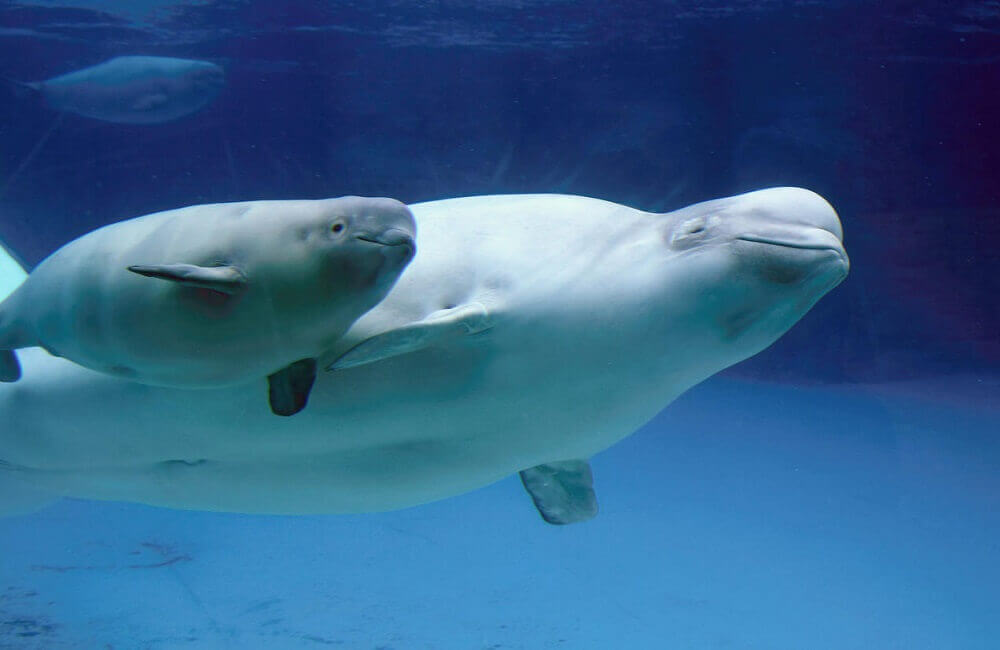
You just cannot help, but adore beluga whales. Their greyish white color and their range of vocal sounds have already earned them the title ‘canary of the sea’. Besides, beluga whales are highly social animals. They always form groups to hunt and migrate and absolutely enjoy interacting with each other. So what’s the current protection status of this lovable marine animal? Are beluga whales endangered? Is there any threat to their existence? We will find out all that and more below. So stay tuned!
Where Do Beluga Whales Live?
Beluga whales are found abundantly in the Arctic ocean. They keep moving between fresh and salt water and can sometimes be found in large rivers as well. Since they have a thick layer of fat, known as blubber, the can easily live in the freezing waters of the arctic and subarctic zones. And lack of dorsal fins also helps them swim under the ice.
Are Beluga Whales Endangered?
No, beluga whales are not endangered and all species of this mammal are under the protection of The Marine Mammal Protection Act. Worldwide, there are hundreds of thousands of beluga whales, but stocks of some species are getting smaller with every passing year, some numbering in hundreds. One such species is the Cook Inlet beluga whale, which is listed as an endangered species under the Endangered Species Act. There were around 1,300 Cook Inlet beluga whales in 1972, the time when the Marine Mammal Protection Act (MMPA) was enacted. However, the numbers declined rapidly in the 90s, leaving just 650 to 700 Cook Inlet beluga whales in 1998.
Unsustainable subsistence harvesting was considered the prime cause behind the declining numbers of beluga whales. The commission thought that controlling hunting would recover the population, but the stock still continued to decline at the rate of 0.4% annually.
Hence, the Endangered Species Act listed the Cook Inlet beluga whales as endangered in 2008 as the population remained less than 350 on an average. In 2016, just 328 Cook Inlet beluga whales were estimated, down by 12 from 2014. The growth rate of this species is still low and there are high doubts whether it would ever be able to recover.
Apart from Cook Inlet, Sakhalin Bay-Nikolaya Bay-Amur River beluga whales are also going down in numbers. It’s estimated that there are around 3,961 Sakhalin Bay-Nikolaya Bay-Amur River beluga whales in Russia. Hence, Sakhalin Bay-Nikolaya Bay-Amur River beluga whales were given depleted status by MMPA in 2016.
Threats To Beluga Whales:
As of now, beluga whales are not endangered, but there are several stressors that pose a threat to their existence. The threats to beluga whales include:
-
Pollution And Contaminants:
Water pollution is one of the major threats to the existence of beluga whales. The contaminants enter the seas and oceans from several sources, especially industries. Once the pollutants enter the waters, the substances move up the food chain and are consumed by the whales. And since beluga whales have a long lifespan and blubber stores, the contaminants accumulate in the body, threatening their health and survival.
Besides, noise pollution also affects the behavior of beluga whales as they rely on sound to communicate with each other. If noise pollution is too high, it can even cause temporary or permanent hearing loss in beluga whales. This affects Cook Inlet beluga whales the most as the inhabit the area of high vessel traffic and human activities.
-
Habitat Loss:
Perhaps the biggest threat to beluga whales is habitat loss or destruction. This covers a wide range, such as barriers that hinder their migration, and affect feeding or breeding or activities that degrade or destroy their habitats. The physical barriers include offshore development such as pile driving, oil and gas exploration, and increased boat traffic.
-
Hunting:
Sport and commercial hunting was once a major threat to the beluga whale population. Thankfully, these activities have been banned by the government. Even the Beluga subsistence harvest in the Cook Inlet of Alaska is regulated now because of lack of recovery. The last time the Alaska natives hunted Cook Inlet beluga whales was in 2005.
However, hunting still plagues these adorable creatures. Beluga whales are hunted extensively even today for clothing, food, shelter, heating and all the other things the Alaskan Native communities require for their livelihood.
-
Strandings:
Stranding refers to the phenomenon when marine malls are stuck in shallow water. Beluga whales are often found stranded when they chase prey or molt or suffer from diseases or injuries. Healthy beluga whales are often able to refloat themselves, but larger whales with the weaker immune system often fail to survive through the tidal cycle. They even die by inhaling muddy water.
-
Diseases:
Disease agents such as parasites, pathogens, and harmful algal blooms are also threats to the population of beluga whales, especially Cook Inlet beluga whales.
-
Reduction In Prey:
Overfishing has led to a major decrease in the amount of prey or food available to beluga whales. And it goes without saying that without sufficient food, any species would experience increased mortality and decreased reproductive rates. Cook Inlet beluga whales are most susceptible to this because they live in an area that has high human activity.
As of now, only one species of the beluga whale is in danger. But if we don’t care for the others now, there will be many such beluga whales and other marine animals on the verge of extinction. So it’s time to give our best to conserve beluga whales and other marine and land animals. If you have any query on why are beluga whales endangered, leave us a comment below.
You May Also Like To Read:
Why Are African Elephants Endangered?
Are Orcas Endangered? What Are The Threats To Killers Whales
Why Are Blue Whales Endangered?
